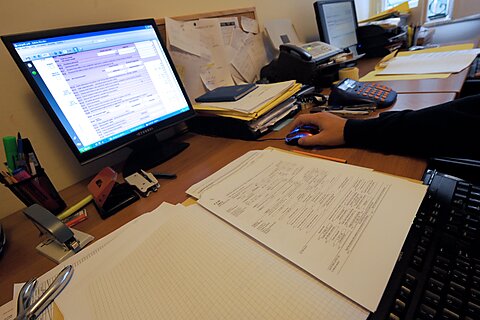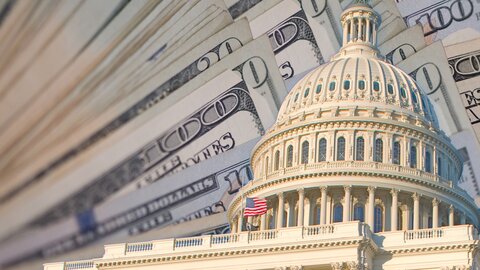As the Wall Street Journal recently reported, retirements and career changes are exacerbating a national shortage of Certified Public Accountants (CPAs). Those departing the profession could be replaced by new college graduates, but state licensing laws appear to be deterring some young people from pursuing an accounting career.
The Bureau of Labor Statistics projects continued growth in the demand for accountants and auditors due to the “complex tax and regulatory environment,” among other factors. Baby boomer retirements and burnout among younger accountants are constraining the supply of new professionals. A shortage of CPAs threatens to prevent local governments from completing timely audits, as required by some states and the federal government.
Although certification is not required for all accounting activities, a CPA is needed to conduct an external audit or defend a tax return before the IRS. Consequently, state laws affecting the entry of new CPAs are exacerbating the shortage of accountants.
All states require individuals seeking a CPA to pass a four‐part, 14‐hour exam maintained and scored by the American Institute of Certified Public Accountants (AICPA). As the accompanying chart shows, the number of individuals sitting for the CPA exam has declined sharply since 2016. Only about 67,000 people took the exam in 2022. Since many test‐takers fail one or more portions of the test and retake them one or more times, the number of individuals obtaining the credential is much lower than the number of test‐takers in any given year.
Many business undergraduates are avoiding the CPA track because states generally require five years of post‐secondary education (which is usually expressed in law as 150 credit hours). This standard is part of the model legislation maintained by the National Association of State Boards of Accountancy (NASBA), whose members include accounting boards from all fifty states, the District of Columbia, Puerto Rico, the Virgin Islands, Guam, and the Northern Mariana Islands.
This means that it is generally impossible to get a CPA without attending at least one year of graduate school. For some students, this requirement may be too much given modest pay and long working hours in the accounting profession.
Policymakers in some states are considering liberalizing their CPA requirements, but the NASBA framework may be a constraint. Oklahoma passed a reform in 2023 that remained within NASBA limits. Previously, the state required candidates to complete all 150 of the required credit hours before taking the CPA exam. With the passage of SB 171 earlier this year, aspiring accountants can take the exam after completing their undergraduate degree, but they will still need to complete the additional 30 credit hours before being certified.
In Minnesota, the state’s society of CPAs (MNCPA) proposed legislation that would grant certification to individuals who pass the CPA exam, complete 120 credit hours of education, and have two years of relevant professional experience. Bills with bipartisan sponsors containing this language were filed in both the Minnesota State House (HF 1749) and Senate (SF 1660), but neither bill passed out of the committee to which it was referred. According to a blog post by MNCPA government relations director Geno Fragnito, the bills will be carried forward into the 2024 legislation when committee debates are expected.
The South Carolina Association of CPAs (SCAPA) is also working on reform legislation. Its draft bill would authorize the state Board of Accountancy “to approve up to thirty hours of educational credit derived from non‐accredited sources, such as unaccredited courses, apprenticeships, certificates, experiential learning, or alternative educational programs.” So, an aspiring CPA would still have to complete a bachelor’s degree but would have multiple educational alternatives to a fifth year of graduate school.
The association’s bill contains other reforms such as expanding the time limit for passing all four CPA exam sections from 18 to 36 months, and giving the board the authority “to issue a reciprocal license to a CPA possessing an active certificate/license/permit to practice from any jurisdiction, regardless of that jurisdiction’s substantial equivalency status.”
As he researched CPA licensing requirements in other states, SCAPA Chair David Knoble found a couple of exceptions to NASBA’s 150‐hour educational standard. New York State allows individuals to become CPAs if they pass the exam and have fifteen years of relevant work experience. Ohio provides a certification path that involves getting four years of relevant experience plus a score of at least 670 on the Graduate Management Admission Test (GMAT). Depending on their reciprocity requirements, other states may prevent New York and Ohio CPAs lacking 150 credit hours of education from practicing.
NASBA’s legislative framework and states’ adherence to it is attractive because it provides an interstate licensing environment akin to universal licensing recognition. But NASBA is setting a universally high bar. As NASBA CEO Ken Bishop told the Journal of Accountancy:
Should any state or jurisdiction lower the licensure requirement to 120 hours, their CPAs would no longer be automatically substantially equivalent and would no longer enjoy the mobility and reciprocal practice privileges they currently are afforded. Lowering the bar to 120 hours is only one of the alternatives we have heard that has been discussed and considered. Others, including lowering the cut score for passing the CPA Exam, have the potential and risk of creating the perception of dumbing down the profession. No one is talking about, for example, lowering the bar to become an attorney, and they’re also suffering from lack of entry.
But the legal profession is not experiencing the kind of acute shortage confronting accountancy. Indeed, Wells Fargo’s Legal Specialty Group found that in 2022 top law firms billed 1.9% fewer hours than they did in 2021. And the number of individuals taking the bar exam has remained fairly steady in recent years.
While the U.S. does not need more lawyers, it does need more CPAs. Minnesota and South Carolina are leading the way toward needed reform of the CPA licensing regime. Accounting societies and legislators in other states should take notice.




